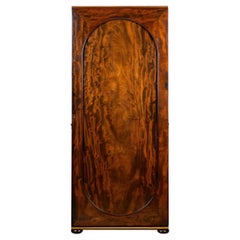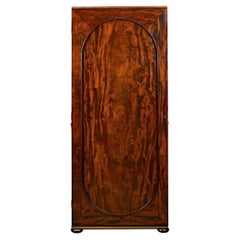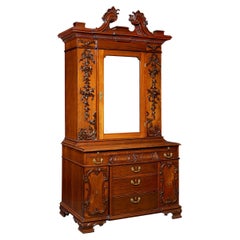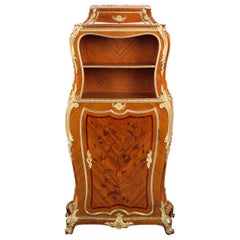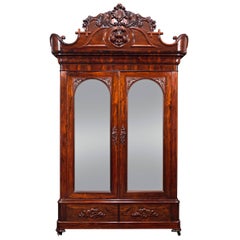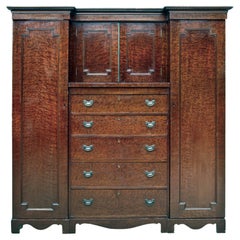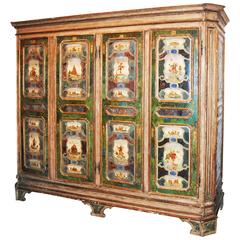M.S. Rau Cabinets
to
Height
to
Width
to
Depth
to
12
12
1
1
1
1
1
3
9
12
6
5
4
4
10
5
5
3
1
12
12
12
1
1
1
Mahogany Upright Cane Cabinet
Located in New Orleans, LA
Classical style and impeccable design distinguish this English upright cane cabinet. Crafted of lustrous Cuban mahogany, this case is comprised of a beautifully paneled door which op...
Category
Antique 19th Century English Cabinets
Materials
Brass
English Upright Cane Cabinet
Located in New Orleans, LA
This English cane cabinet exhibits classical style and impeccable design. Crafted of lustrous Cuban mahogany, this upright case features a beautifully paneled door which opens to rev...
Category
Antique 19th Century English Cabinets
Materials
Brass
$28,500
Mahogany Bureau Cabinet After Thomas Chippendale
By Thomas Chippendale
Located in New Orleans, LA
This extraordinary Irish bureau cabinet was crafted based on a design for a desk and bookcase drawn from Thomas Chippendale’s famed 1762 edition of The Gentleman and Cabinet-Maker's ...
Category
Antique 18th Century Irish Chippendale Cabinets
Materials
Mirror, Mahogany
19th Century French Secrétaire by Durand
By Gervais Durand
Located in New Orleans, LA
Superior craftsmanship and intricate marquetry characterize this rare secrétaire by Gervais-Maximilien-Eugène Durand, one of the most popular French ébénistes of the 19th century. Th...
Category
Antique 19th Century French Louis XV Secretaires
Materials
Bronze, Ormolu
Louis XIV Inspired French Linen Press
Located in New Orleans, LA
Enveloped in sumptuous parquetry and doré bronze, this majestic Louis XIV inspired French linen press displays the characteristics of superior craftsmanship and luxurious design seen in the creations of the iconic Françios Linke. Crafted of sumptuous kingwood, the glorious parquetry door opens to reveal six compartments used to store linens, such as those for the bedroom or even the dining table. The masterful woodwork is flawlessly balanced by intricate doré bronze mounts in the form of Neoclassical floral swags, garlands, plumes and acanthus scrolls. The delicately spiraled doré bronze feet give the cabinet a sense of lightness and balance. Enhanced by a beautiful rouge marble top, this elegant linen press is an excellent example of late 19th century French furniture...
Category
Antique 19th Century French Louis XIV Linen Presses
Materials
Bronze
John Henry Belter Rosewood Armoire
By John Henry Belter
Located in New Orleans, LA
One of the rarest furniture forms created by John Henry Belter, this armoire is a testament to this legendary cabinet maker's talent. Recognized as a Pioneer in design and craftsmans...
Category
Antique 19th Century American Rococo Revival Wardrobes and Armoires
Materials
Rosewood
19th Century Coromandel Inlaid Vitrine
Located in New Orleans, LA
Highly-prized coromandel, or East Indian ebony, was used to create this beautiful Victorian vitrine. Featuring delicate inlay in the Victorian/Edwardian style and glass panels framed in the equally luxurious satinwood, this cabinet is constructed to fit flush against a wall with baseboards. Elegant cabinets such as this are perfect for displaying one's treasures, but with original locks, keys, mirrors and fleur-de-lis fabric, this case is a prized possession unto itself,
circa 1890.
Measures: 30" wide x 14 ½" deep x 41 ½" high.
Coromandel ebony is variegated brown and black, often called "streaky," wood. It is considered a highly valuable wood for turnery, fine cabinet...
Category
Antique 19th Century English Victorian Vitrines
Materials
Glass, Mirror, Ebony, Satinwood
King George I Ambassadorial Secrétaire-Cabinet
Located in New Orleans, LA
This highly important secrétaire-cabinet was crafted for and specially ordered by King George I for the British Ambassador to Russia. From its craftsmanship and materials to its exceptional artistry, it is a work of royal and historic significance that exudes power in each and every detail. The broken pediment at its apex features the simplified royal coat of arms bearing the king’s crown, while the interior is adorned by portraits of the British Royal Family. Placed within the ambassador’s St. Petersburg home, this entirely unique piece of furniture would have been a potent reminder of England's grandeur and political importance.
Relations between England and Russia during this period were at an all-time high. Peter the Great had traveled to England in 1698 as part of his widely known “Grand Embassy” tour, wherein he attempted to gain foreign support against the Ottoman Empire. He spent a period of nearly four months there, meeting with King William III and his court on numerous occasions. Noted academic Arthur MacGregor wrote concerning the impact of the trip, “For two decades following Peter's visit, British influence in Russia reached a peak. It manifested itself in social custom, in craft practice and in ships and naval organization... it reached a significant sector of the population before relations cooled once again and the two nations pulled back from this era of unprecedented cordiality.”
First and foremost, however, it is a reminder of British might and influence. By the reign of King George I, England had come into its own as a world power. Unique in its design, this cabinet is a reflection of the country’s might. It is crafted from the highest-quality solid walnut and burr walnut adorned by gilded lock plates and engraved hinges. The presence of ormolu at its apex and lining the doors was a rarity for this period, and its addition makes manifest the importance of the design.
The outer doors open to reveal multiple interiors, including fifteen separate drawers around a central cupboard; the cupboard doors each bear mezzotint portraits of George I and his father, Ernest Augustus, Elector of Hanover. An etching after the portrait of George I dating to circa 1716 is in London’s Royal Academy. A second, inner pair of doors are adorned by mezzotints of the Prince and Princess of Wales (later Queen Caroline and George II), which are both after portraits by Sir Godfrey Kneller dated 1716 in the Royal Collection. A final portrait is revealed on the very interior of the cabinet, where a mezzotint of Frederick, Anne, Amelia and Caroline, children of the Prince of Wales, resides. An etching (circa 1715-1720) after this portrait can be found in the National Portrait Gallery (London).
Apart from its abundance of royal portraiture, the cabinet features stunning painted decoration, including floral designs as well as clouds, birds and trees in a bucolic motif reminiscent of Eden. Its lower portion is a study in both form and function, featuring a fitted secrétaire-drawer above three additional drawers for storage. The cabinet appears in The Shorter Dictionary of English Furniture by R. Edwards from 1964, a text that is regarded as the bible of British furniture design. Edwards describes it as a “writing cabinet...given by George I to the British Ambassador at the Russian court.”
The cabinet was likely made for the 18th-century German diplomat and writer Friedrich Christian Weber, who represented English interests at the Russian court from 1714 until 1719. Although Weber’s tenure as ambassador was relatively short, while in St. Petersburg, he authored his account entitled Das veraenderte Russland (The Present State of Russia), which was published in three volumes in 1721, 1739 and 1740. It may, however, also have been made for George Douglas, 2nd Earl of Dumbarton, who served as ambassador alongside Weber in 1716. Diplomatic relations ceased between the two countries in 1721.
In 1928, the cabinet appeared for sale at the International Exhibition of Antiques & Works of Art in Olympia. It had previously been in the collection of the Woltner family of Bordeaux, the celebrated vintners who owned the estate Château Laville Haut-Brion and produced wine of the same name. According to the family, Monsieur Woltner was given the cabinet as a gift from an aunt who lived in Russia for many years. After leaving the Woltner collection, the cabinet was acquired by William Berry...
Category
Antique 18th Century English Georgian Secretaires
Materials
Brass
19th Century French Vitrine by Francois Linke
By François Linke
Located in New Orleans, LA
This rare and stunning vitrine was crafted by the illustrious French ébéniste François Linke. A master of the Louis XVI style, Linke was renowned for his highly original designs that...
Category
Antique 19th Century French Rococo Vitrines
Materials
Bronze
18th Century English Secretary
Located in New Orleans, LA
Queen Anne period furnishings such as this walnut secretary are incredibly rare and important examples of English cabinetmaking. This secretary is of the most outstanding caliber, boasting desirable double bonnet, mirrored cabinet doors...
Category
Antique 18th Century English Queen Anne Secretaires
Materials
Walnut
19th Century Dutch Bureau Bookcase
Located in New Orleans, LA
This magnificent and important Dutch mahogany bureau bookcase, exuberantly carved and adorned with superb figural carvings, impressive scrolled feet and elaborate applied decoration....
Category
Antique 19th Century Dutch Other Bookcases
Materials
Mahogany
19th Century Watch Winding Display Cabinet
Located in New Orleans, LA
This incredible, one-of-a-kind watch display cabinet brings together the beauty of an antique with the functionality of modern technology. Crafted of mahogany, this 19th century jewelry display cabinet...
Category
Antique 19th Century Unknown Empire Cabinets
Materials
Mahogany
Related Items
Antique Scottish Armoire
Located in Malibu, CA
This antique armoire is made from beautiful hardwood and burled walnut veneers. Easy to move and assemble, it is constructed from six separate pieces that stack together. There are two tall wardrobes on each side flanking the center sections. The wardrobe sections have dowels for hanging clothes and small drawers at the bottom. The top center section has locking doors which open to a single compartment. It is large enough to hold a small sound system or tv, and there is a small hole cut in the back for wiring. The lower center section consists of five 5 large graduating drawers. The top drawer has 2 dividers to create 3 sections. All drawers are lined with gilded multi-color Florentine paper...
Category
Antique Late 19th Century Scottish Georgian Cabinets
Materials
Walnut, Hardwood, Paper
19th Century Venetian Armoire
Located in New Orleans, LA
Beautiful Italian armoire made up of exceptional carved and painted panels.
Category
Antique 19th Century French Wardrobes and Armoires
French Limed Oak Armoire
Located in Antwerp, BE
Limed oak two door armoire.
Height 210 cm.
Width 127 cm.
Depth 64 cm.
Category
Late 20th Century French Mid-Century Modern Wardrobes and Armoires
Materials
Glass, Wood, Oak
French Art Deco Armoire
Located in Pompano Beach, FL
French Art Deco armoire made of amboyna burl with marquetry and inlaid mother-of-pearl. Large rectangular mirrored center door and two large si...
Category
Vintage 1930s Wardrobes and Armoires
Materials
Amboyna
Large English Oak Haberdashery Cabinet
Located in Staffordshire, GB
circa 1930
Large English Oak Haberdashery Cabinet, divides into two pieces.
sku 1254
W182 x D52 x H198cm
Category
Early 20th Century Cabinets
Materials
Oak
Armoire, Bleached Oak, France, circa 1940
Located in Kaštel Sućurac, Splitsko-dalmatinska županija
Armoire, Bleached Oak, France, circa 1940
Echoing the Sculptural Language of French Provincial Modernism
Sculptural in stance and restrained in detail, this tall French cabinet fro...
Category
Vintage 1940s French French Provincial Cabinets
Materials
Oak
1900s French White Wooden Armoire
Located in High Point, NC
A white wooden cabinet from France, circa 1900. This handcrafted armoire stands on turned feet, guarded by a golden-brass lock. A refreshing space maker and a stylish storage. Adorne...
Category
Antique Early 1900s French French Provincial Wardrobes and Armoires
Materials
Brass
English Oak Wood Clothing Cabinet
Located in Chicago, IL
This sturdy chest was made from quarter-sawn oak in the mid-19th century. The inside of the piece features a shelf for storage and more can be added for a modest cost. Wear consisten...
Category
Antique Mid-19th Century English Cabinets
Materials
Oak
19th Century Empire Walnut Secretary
Located in Houston, TX
French first Empire period Secretaire à Abattant, also known as a drop-front secretary, fall front or cantilevered desk. Under the dark grey marble top is a secret, entablature drawe...
Category
Antique Early 19th Century French Empire Secretaires
Materials
Marble, Ormolu
Small Mahogany Cabinet with Cane Doors by Harvey Probber
By Harvey Probber
Located in Dorchester, MA
Designed by Harvey Probber, this small midcentury cabinet features a mahogany case on a plinth base. Cane-front sliding doors conceal, on the left, three deep drawers with white lacq...
Category
Vintage 1950s American Mid-Century Modern Dressers
Materials
Cane, Mahogany, Lacquer
Midcentury Cabinet with Cane Doors in Oak, 1960s
Located in Lejre, DK
Cabinet with cane door in wax finished Scandinavian oak. Designed and made in Sweden. Great original condition.
Category
Vintage 1960s Swedish Scandinavian Modern Cabinets
Materials
Brass
Antique Romweber English Chippendale Georgian Mahogany China Display Cabinet 78"
By Romweber Furniture Co.
Located in Dayton, OH
Early 20th Century English Chippendale / Georgian style China Hutch / Curio / Display Cabinet by Romweber Industries. Circa 1920s. Made from crotch mahogany with a graceful breakfro...
Category
Early 20th Century American Chippendale Cabinets
Materials
Glass, Mahogany
$2,800 Sale Price
20% Off
H 77.5 in W 40.5 in D 16.5 in
